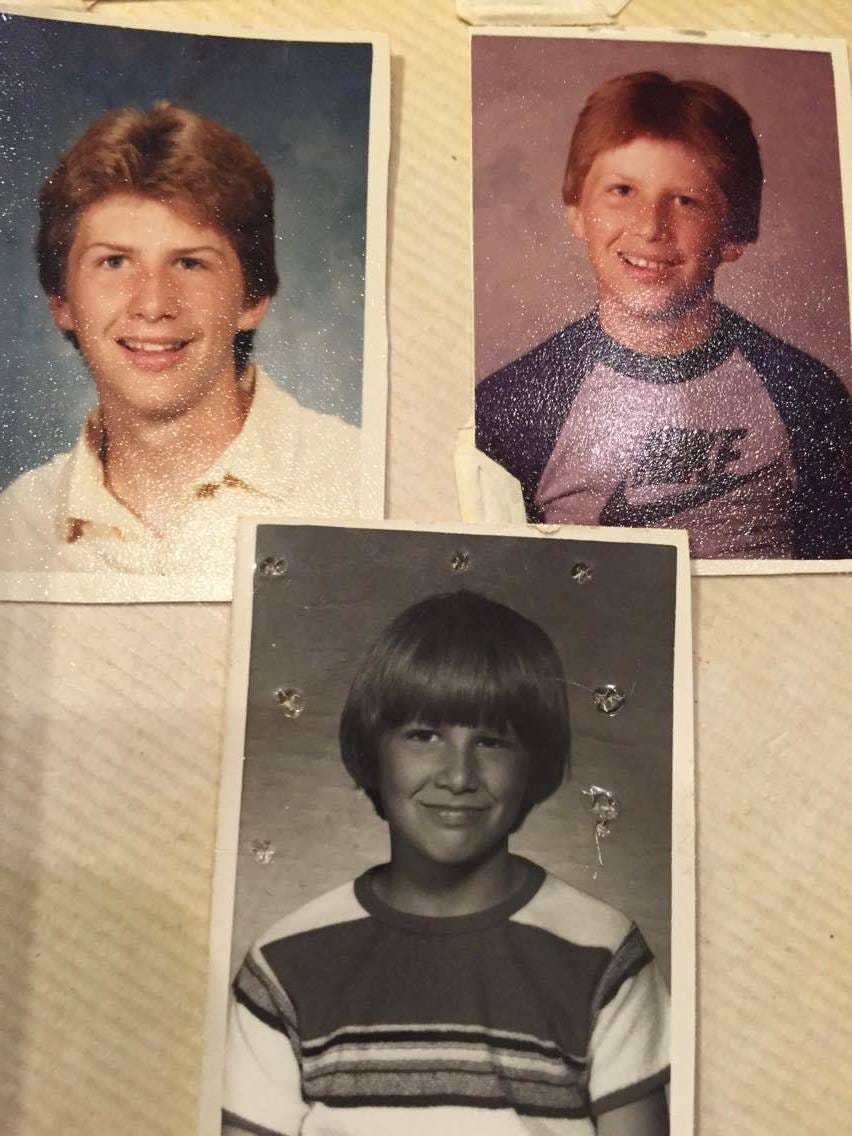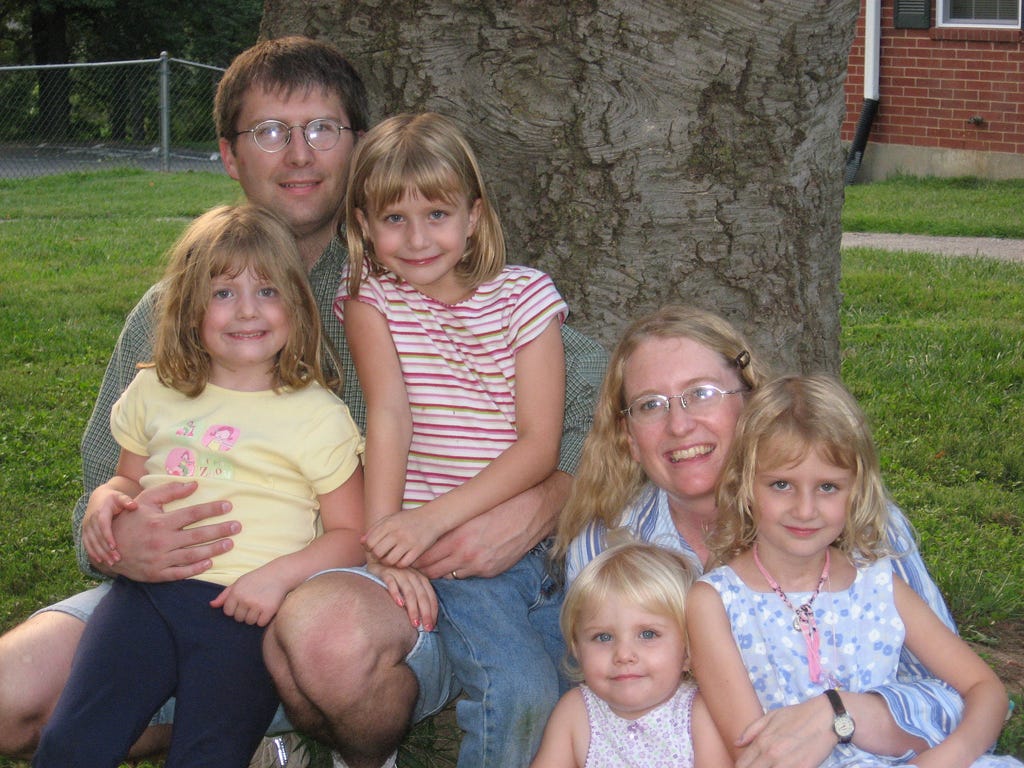Dear Reader,
I’m going to warn you up front: this edition of Second Drafts may come off overly narcissistic, simply because the majority of it is about me (I know, I know - “Enough about me…what do you think about me?” - sorry, but that was last week).
Truth be told, in the midst of a good but goofy week schedule-wise (not to mention the fact that the past three issues have been on modernity, bigotry, and media bias, respectively), well, I thought we could all use some comic relief this week, and I don’t know a bigger joke than me.
So, consider that your warning and proceed with caution. If it’s all too much, be sure to check out the Hot Takes and Fresh & Random Links and just call it done. There’s always next week.
As always, thanks for reading,
Craig
P.S.: As a reminder, you’re welcome and encouraged to email me directly with feedback, content ideas, links, etc. at cmdunham [at] gmail [dot] com. Just know that, unless you specifically tell me not to, I may quote you here (though it will always be anonymously).
Hot Takes
“Montana to Feds: No More No-Work Bonus” - I’m sure not everyone feels the same way, but I’ve been impressed with how our new governor has been handling Helena since taking office in January. This new initiative is just one example:
“The economy is roaring back as government lockdowns finally end, and employers are struggling to find workers. Enter Montana with a novel idea: telling the feds that it doesn’t want their extra payments for not working.
On Tuesday Gov. Greg Gianforte said that by June 27 Montana will end its participation in the federal supplemental unemployment benefit program that provides the jobless with an additional $300 a week through September. Congress enacted the bonus in its Covid legislation, but Mr. Gianforte believes it has become a disincentive to work. So do most economists.”
So do I. As a fiscal conservative who was against the bailouts in 2008, I recognize the past year has been a different scenario in need of financial help this time around because of Covid. However, we’re to a point (and frankly, have been for a while), where it’s time to get people back to work before yet another generation gets addicted to the opioid of the government dole.
“Montana already offers a maximum individual unemployment benefit of $572 a week, and with the federal bonus the jobless can collect the equivalent of up to $21.80 an hour for doing nothing. With state and federal benefits combined, about half of Montana’s workers make more than their prior earnings while on unemployment, says University of Chicago economist Peter Ganong.”
I’m glad to see Montana moving forward and hope other states will follow suit.
“The CDC's Guidance for Summer Camps Is Insane” - For the sake of kids everywhere (including my two high-school-aged daughters), and as a former camp director for 10 years, please let me encourage all camp personnel to disregard the entirety of this “guidance” from the CDC for your particular summer operation. To quote from the article and appeal to common sense:
“This is among the most restrictive, unrealistic guidance the agency has released during the pandemic. It's more limiting than the CDC's guidance for vaccinated people exercising outside more generally. If followed, summer campers would be miserable, deprived of physical contact, and in considerable danger of overheating. The government has essentially recommended that summer camps treat kids like prisoners.”
Camp directors, lead us out of the ridiculousness of our hand-wringing teachers unions and the fright of our fear-mongering media and let's have camp - full-bore, unmasked, and for the good of the nation. After the past year-and-a-half, if kids need anything, it's to be outdoors unencumbered this summer.
(Note: As a free service, please send all complaints and pushback my way, and I will be happy to serve as your adjunct media response team.) Good grief.
“The Wonder of Albert Pujols” - Former (and still beloved) St. Louis Cardinal Albert Pujols (2001-2011) was released yesterday by the Los Angeles Angels, for whom he has played since 2012. Within the next seven days, the Angels can either trade Pujols or place him on irrevocable outright waivers. Any of the 29 other big league teams can claim him off waivers. If Los Angeles doesn't trade him and he is not claimed off waivers within a week, he will become a free agent.
“Albert Pujols, the greatest hitter of his generation and the best first baseman since Lou Gehrig, was designated for assignment by the Los Angeles Angels on Thursday with a .198 batting average. Pujols had been a .300 career hitter ever since his fifth game in the big leagues. It fell below .300 20 years later on the second day of last season. Hitting .218 since then, he left the Angels—and probably baseball for good—at .298.”
Our family lived in St. Louis from 2005-2011 and caught many a game at Busch Stadium III during the years when Albert was in his prime. We saw him take the Cardinals to three World Series (winning two), but what was always uncanny to me when seeing him play live was just how absolutely reliable he was when the game was on the line, runners were on the bases, and Albert was at the plate. Whether with a base hit or a homerun, he never - ever - seemed to disappoint.
“In his 11 seasons with the Cardinals, Pujols posted a .328/.420/.617 slash line with 445 home runs, 1,329 RBIs and 86.6 WAR. He won three MVP awards, and finished second four other times. A 10-time All-Star, Pujols won the World Series with St. Louis in ‘06 and ‘11. The Cardinals lost to the Red Sox in the '04 World Series.”
We left St. Louis the same year Albert did, and our hearts broke when he signed with the Angels. I’d love it if the Redbirds picked him up this season or brought him back next year on a one-year contract, just to see him back in a Cardinals uniform. Regardless, no one can argue against Pujols being a Hall of Famer; he was “El Hombre,” and it was a joy and a gift for all of us to have seen him play.
The Raw of Averages
Twenty years ago (that’s 2001 for those who still think “twenty years ago” means the 1990s), I submitted an honest and heartfelt essay to Newsweek’s “My Turn” column, the goal of which is to publish “a personal, persuasive essay in which the writer presents an opinion and tries to persuade the reader to agree with it.” My goal was simpler: all I wanted was fame and validation, but submitting a navel-gazing piece to a national news magazine ten days before 9/11 does not easily lend itself to justifying one’s existence. I never heard back that they even received my submission.
Nevertheless, I always liked this piece for its honesty and voice. Looking back twenty years later, I still feel the insecurities and recognize the pain, neither of which have fully gone away. Back in the day, I was looking for an outlet (2001 was long before social media and a full year before I became an early-adopter of blogging), but in addition to the underlying motives of fame and validation, I genuinely wanted to help people through my writing. I suppose little of that has changed in terms of desire; as to the results (then or now), well, that’s beyond what I can really measure.
With all that as an overwritten preface, let me introduce you to my 30-year-old self and his thoughts, after which, my 50-year-old self will come back with some observations and a lesson or two learned from the past twenty years.
The Raw of Averages: Why My Own Mediocrity Rubs Me the Wrong Way
“‘Cause they told me when I was younger
Said, ‘Boy, you're gonna be President’
But just like everything else those old crazy dreams
Just kinda came and went”
‘Pink Houses’ by John MellencampI am thirty years old. It has taken me these years to come to the conclusion that I am probably going to die having lived little more than an average life. Gone are the distant lands to be discovered and named; already on the shelf are the last of the true original ideas about which to think and write. Sadly, I do not look to the 21st century as being ‘my time,’ but as the century that merely comes after the 20th.
And that stinks.
I’ve come to realize that I probably won’t change the world in ways I once thought I would. When I ask myself if others will take note a hundred years from now of how I lived, I stop short – why would they do so then when they don’t now? I’m the one who seems to be reading the books others write; I’m the one listening to the songs others sing. Somebody’s got to, I guess, and it seems to be my lot in life.
It wasn’t always this way. As a kid, I grew up sure that I was moving toward greatness, mostly because there was no place to go but up. I was born the oldest of three to average parents who live a nice, average life on a 600-acre farm, farming (Dad) and teaching high school English (Mom). We had two dogs and a cat, went to church with the rest of the Methodists in town, and never paid too much attention to what went on in other places of the world like New York or London. Mom and Dad are still happily married after thirty-one years together, a fact that may actually represent the only non-average statistic of my existence.
Growing up, I played two sports and lettered in both beginning my sophomore year. I sang in the chorus, played trombone in the band, and competed in music and speech contests. I was a leader in youth group. I worked on the farm. I wrote and performed in musicals. I was elected class president three out of four years. I was known throughout school as the talented kid who one day would probably become President, or at least make it out of the county – either would have been an equally impressive accomplishment for someone growing up in the self-proclaimed “Purple Martin Capital of the World.”
I squeaked out an ACT score of 25 (not bad for just walking in and taking it, but still pretty average), got accepted to three state universities in the Midwest, and graduated with a degree in geography only because I couldn’t get into journalism. The reason? I wasn’t in the top ten percentile of my class (I mostly got B’s and C’s and finished with a 2.75 GPA on a 4.0 scale, about a B- average). Of course, I wasn’t in the bottom ten percentile either, but that didn’t really matter. The theme of being average remained the same – I was as common as a cold.
This has been the story of my life. I’ve always been a talented “Jack of all trades, Master of none” kind of guy who has been neither the worst nor the best at anything I’ve tried. As a result, my range has limited my peak, and I’ve found myself wondering if this is as good as I get, which really isn’t all that bad, I suppose, but not all that good, either, at least not in a country that worships only the highest-paid, best-known, and most attractive people. It’s average, I guess, just like everything else about me.
An older man I greatly respect once told me that 30 was the most frustrating year of his life because he had been alive so long and had accomplished so little. I feel much the same way. Despite being a committed husband and father to Megan and our 2.3 children (our third is on the way), I struggle at times with the responsibilities that come with leading my family. Despite what I do as a program director at a Christian camp and conference center in Colorado, the brightness of my personal dreams – publishing a book, being President, living as a missionary for ten years in Uganda – is beginning to fade. This is due somewhat to circumstance (I can’t make a book publisher publish me if they don’t want to), but mostly as a result of my own mediocre, average self – for whatever reason, I’m just not who (and all) I thought I would be by now.
Maybe all this shouldn’t hurt as much as it seems to (after all, that’s life, so deal with it); or maybe it should hurt a whole lot more than it does (after all, it’s my life and I have to live it on a daily basis). Regardless, as I think about the next 30 years, I wonder if I’ll get any kind of chance to catch up – to really impact the world on a timetable and scale more in line with my initial dreams. This good fortune would soothe the raw of averages in my life, not to mention heal a part of me plenty tender and sore from the ache of not having done so thus far.
My Thirties & Forties
Two years after submitting the article to no avail, I published my first book at 32. At 34, I went to seminary to better learn how to study, teach, and live my Christian faith, spending the next six years as both a student and a teacher in St. Louis. The trajectory felt good, especially since I finally took some first steps during this time to deal by way of psychiatry and medication with what had long been a melancholic depression.
At 40, I was recruited to lead a classical school and help plant a church in Oklahoma City. At 44, I was asked to resign from heading a new school I helped birth by way of a merger of the one I was leading with another one in OKC. The reason for my firing? It was stated I “wasn’t a fit going forward” to lead what I had successfully merged.
Later that year, I was recruited to lead a classical school in Bozeman with the stated purpose of “clarifying the mission, building the culture, and improving the academic and extracurricular offerings.” Sadly, I was fired at 49 due to “stagnant enrollment.”
After being fired twice from positions to which I had given more blood, sweat, and tears than anyone other than God and Megan will know, the ambition I had in my twenties and that I wrestled with in my thirties was pummeled, strangled, and died a violent but uneventful death in my forties. Without meaning to sound overdramatic (and it’s okay if you roll your eyes as you like), I don’t dream dreams anymore about the future; sometimes it’s all I can do to hope there will just be one.
Range
One of the books I read and took some comfort from in the winter of 2019 was Range: Why Generalists Triumph in a Specialized World by David Epstein, former science and investigative reporter at ProPublica, crime reporter at a New York City tabloid, senior writer at Sports Illustrated. According to his bio, Epstein “has worked as an ecology researcher in the Arctic, studied geology and astronomy while residing in the Sonoran Desert, and blithely signed up to work on the D-deck of a seismic research vessel shortly after it had been attacked by pirates.”
Inspired by his own experiences as well as a vast amount of research and study for the book, Epstein’s thesis is that broader - not narrower - experiences are key to thriving.
“Learning about the advantages of breadth and delayed specialization has changed the way I see myself and the world. The research pertains to every stage of life, from the development of children in math, music, and sports, to students fresh out of college trying to find their way, to midcareer professionals in need of a change and would-be retirees looking for a new vocation after moving on from their previous one.
The challenge we all face is how to maintain the benefits of breadth, diverse experience, interdisciplinary thinking, and delayed concentration in a world that increasingly incentivizes, even demands, hyperspecialization. While it is undoubtedly true that there are areas that require individuals with precocity and clarity of purpose, as complexity increases - as technology spins the world into vaster webs of interconnected systems in which each individual only sees a small part - we also need more people who start broad and embrace diverse experiences and perspectives while they progress. People with range.”
Epstein’s words didn’t come with much fame, but they did offer some validation to the general “averageness” of my thirtieth year, as well as my life in general. Like Epstein, I’ve worn many hats - farm kid, geographer, camp director, missionary, rock star, author, seminarian, teacher, coach, headmaster, high-tech cryogenics communications manager - but I wouldn’t have had this breadth of experiences had I actually been really good at any one of them. I suppose one could accuse me of attempting to rationalize or excuse away my average existence, but I’ve come to think of it as a sovereign God’s (strange and confusing) will for my life that I’ve stopped trying to plan and control.
Perhaps doing this in a strategic plan-fascinated world, I’m as unique as they come.
“I Will Not Leave You Until I Have Done What I Have Promised You”
This, of course, doesn’t mean I’m just winging it, but it does mean I’m trying not to worry about it. Just this week, I told a friend how I wasn’t sure what to make of all I went through in my forties, but God has been God through them and I trust that theme will continue through my fifties and however little or longer I have (personally, I’m hoping for a nice round three score and ten before calling it quits).
The promise and reassurance that has undergirded me from the time I left Mizzou for Colorado - then St. Louis - then Oklahoma City - then Bozeman has been God’s promise and reassurance to Jacob (a fellow scoundrel) in his dream at Bethel in Genesis 28:15:
“Behold, I am with you and will keep you wherever you go, and will bring you back to this land. For I will not leave you until I have done what I have promised you.”
My response has always tended to be very much like Jacob’s; that is, he recognized a good deal when he saw one, but still tried to negotiate terms:
“Then Jacob awoke from his sleep and said, ‘Surely the LORD is in this place, and I did not know it.’ And he was afraid and said, ‘How awesome is this place! This is none other than the house of God, and this is the gate of heaven.’ So early in the morning Jacob took the stone that he had put under his head and set it up for a pillar and poured oil on the top of it. He called the name of that place Bethel, but he name of the city was Luz at the first.
Then Jacob made a vow, saying, “If God will be with me and will keep me in this way that I go, and will give me bread to eat and clothing to wear, so that I come again to my father’s house in peace, then the LORD shall be my God, and this
stone, which I have set up for a pillar, shall be God’s house. And of all that you give me I will give a full tenth to you.”
Throughout the rest of the book, Jacob continues to be less than worthy of God’s “wherever you go” promise, but the grace in his story is the same as the grace in mine: God is present and willing to wander with the most average of characters to fulfill what He has planned and promised. If I have one ambition (as opposed to the dozens before), it is to trust God simply for that. This (I think) is what I have learned.
So, twenty years after submitting that Newsweek article, my “demons” - insecurity, inferiority, feeling “common as a cold” (still one of the greatest lines I’ve ever written) - are all still there. The difference is I’ve lived enough life now to recognize what - or, I should say, Who? - is also there, and always has been when things have gone south. I don’t claim to know all that God has promised me to do, but I do trust that He’s not going anywhere until He does it.
One day I may write about it all in more detail…or not; what’s done is done, and God is sovereign over all of it. There have been plenty of people who have walked through the fire(s) with us, and we couldn’t be more grateful. Have we met our quota of hard things in this life? I doubt it. Is that a scary proposition? It could be. Will that change anything? By God’s grace, I hope not. I’m not making plans one way or another.
Despite all my averageness, though, I’d still maybe like a chance to be President…
Post(erity): “Put Me In, Coach, I’m Ready to Play”
Each week, I choose a post from the past that seems apropos of something (of course, you’re always welcome to search the archives yourself whenever you like).
This week’s post, “Put Me In, Coach, I’m Ready to Play,” comes from October 14, 2006, and takes a trot down the base path of my pseudo-storied high school baseball career. An excerpt:
“While I experienced a fair amount of success in my sports days, I always felt like I understood the games (baseball and basketball) better than I played them. I knew what needed to be done in just about any given situation; I just never had the pure, raw ability to get it done myself.”
Fresh & Random Linkage
“Rapid Population Growth Gives Montana 2nd US House Seat” - Thanks to the 2020 census, Montana will have two representatives to the U.S. House again. (If anybody needs something done in the House, hit me up. They’ll know me there.)
“‘Sanditon’ Renewed for Seasons 2 & 3” - I like to think our little group had something to do with this (or at least that's what I'm telling myself and others who may ask).
New trailer out for “Stranger Things 4”:
Until next time.
Why Subscribe?
Why not? Second Drafts is a once-a-week newsletter delivered to your inbox (you can also read it online or through your RSS reader) and it’s totally free.)
Keep Connected
You’re welcome to follow me on Twitter.











